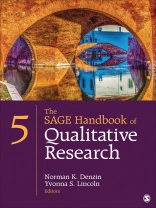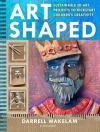The substantially updated and revised Fifth Edition of this landmark handbook presents the state-of-the-art theory and practice of qualitative inquiry. Representing top scholars from around the world, the editors and contributors continue the tradition of synthesizing existing literature, defining the present, and shaping the future of qualitative research. The Fifth Edition contains 19 new chapters, with 16 revised—making it virtually a new volume—while retaining six classic chapters from previous editions. New contributors to this edition include Jamel K. Donnor and Gloria Ladson-Billings; Margaret Kovach; Paula Saukko; Bryant Keith Alexander; Thomas A. Schwandt and Emily F. Gates; Johnny Saldaña; Uwe Flick; Mirka Koro-Ljungberg, Maggie Mac Lure, and Jasmine Ulmer; Maria Elena Torre, Brett G. Stoudt, Einat Manoff, and Michelle Fine; Jack Bratich; Svend Brinkmann; Eric Margolis and Renu Zunjarwad; Annette N. Markham; Alecia Y. Jackson and Lisa A. Mazzei; Jonathan Wyatt, Ken Gale, Susanne Gannon, and Bronwyn Davies; Janice Morse; Peter Dahler-Larsen; Marc Spooner; and David A. Westbrook.
قائمة المحتويات
Introduction: The Discipline and Practice of Qualitative Research – Norman K. Denzin and Yvonna S. Lincoln
Part One: Locating the Field
Qualitative Methods: Histories in Social and Educational Research – Frederick Erickson
Ethics and Politics in Qualitative Research – Clifford Christians
Ethics, Research Regulations and Critical Social Science – Gaile S. Cannella ad Yvonna S. Lincoln
Part Two: Paradigms and Perspectives in Contention
Paradigmatic Controversies, Contradictions, and Emerging Confluences – Egon Guba, Yvonna Lincoln, Sue Lynham
Feminist Qualitative Research: in the Millennium’s First Decade Challenges and Contours – Virginia Olesen
Feminist Qualitative Research in the Millennium’s Second Decade – Marjorie Lyne De Vault
Critical Race Theory Scholarship and the Post-Racial Imaginary – Jamel Donnor and Gloria Ladson-Billings
Doing Indigenous Methodologies—a letter to a research class – Margaret Kovach
Critical Pedagogy and Qualitative Research: Moving to the Bricolage – Joe L. Kincheloe, Peter Mc Laren, Shirley R. Steinberg, and Lila D. Monzo
Methodologies for Cultural and Social Studies in an Age of New Technologies – Paula Saukko
Queer/Quare Theory: Worldmaking and Methodologies – Bryant Alexander
Part Three: Strategies of Inquiry
The Marketization of Research: Implications for Qualitative Inquiry – Julianne Cheek
Case Study Methodology – Thomas Schwandt and Emily F. Gates
Performance Ethnography – Judith Hamera
Ethnodrama and Ethnotheatre: Research as Performance – Johnny Saldaña
Advancing a Constructionist Analytics – James A. Holstein
Evolving Grounded Theory and Social Justice Inquiry – Kathy Charmaz, Robert Thornberg and Elaine Keane
Triangulation – Uwe Flick
Data and Its Problematics – Mirka Koro-Ljungberg, Maggie Mac Lure and Jasmine Ulmer
TESTIMONIO, and Narrative Authority – Antjie Krog
Critical participatory action research on State violence: Bearing wit(h)ness across fault lines of power, privilege and dispossession – Maria Elena Torre, Brett Stoudt, Einat Manoff, Michelle Fine
Part Four: Methods of Collecting and Analyzing Empirical Materials
Observation in a Surveilled World – Jack Bratich
Narrative Inquiry: Toward Theoretical and Methodological Maturity – Susan Chase
Critical Arts-Based Inquiry – Susan Finley
The Interview – Svend Brinkmann
Visual Research – Eric Margolis and Renu Zunjarwad
Autoethnography and the Other: Performative Embodiment and a Bid for Utopia – Tami Spry
Ethnography in the Digital Internet Era: From fields to flows, descriptions to interventions – Annette N. Markham
Analyzing Talk and Text – Anssi Perakyla and Johanna Ruusuvuori
Focus Group Research and/in Figured Worlds – George Kamberelis, Greg Dimitriadis, Alyson Welker
Thinking with Theory: A New Analytic for Qualitative Inquiry – Alecia Y. Jackson & Lisa A. Mazzei
Creating a Space in between: collaborative inquiries – Jonathan Wyatt, Ken Gale, Susanne Gannon, and Bronwyn Davies
Part Five: The Art and Practices of Interpretation, Evaluation, and Presentation
Evidence, Criteria, Policy and Politics: the debate about quality and utility in educational and social research – Harry Torrance
Reframing Rigor in Qualitative Inquiry – Janice Morse
Writing as a Method of Inquiry – Laurel Richardson, Elizabeth Adams St. Pierre
The Elephant in the Living Room, or Extending the Conversation about the Politics of Evidence – Norman K. Denzin
Braiding Narrative Ethnography with Memoir and Creative Nonfiction – Barbara Tedlock
Qualitative Evaluation: Methods, Ethics, and Politics with Stakeholders – Peter Dahler-Larsen
Part Six: Into the Future of Qualitative Research
Qualitative Research and Global Audit Culture: The Politics of Productivity, Accountability & Possibility – Marc Spooner
Critical Issues for Qualitative Research – David Westbrook
Epilogue: Toward a “Refunctioned Ethnography” – Yvonna S. Lincoln and Norman K. Denzin
عن المؤلف
Yvonna S. Lincoln is Professor Emerita at Texas A&M University, where she held the Ruth Harrington Chair of Educational Leadership and was Distinguished Professor of Higher Education. She is the coeditor of the journal Qualitative Inquiry, coeditor of the first through six editions of The SAGE Handbook of Qualitative Research, and coeditor of The SAGE Handbook of Critical and Indigenous Methodologies. As well, she is the coauthor, editor, or coeditor of more than a half dozen other books and volumes. She has served as the President of the Association for the Study of Higher Education and the American Evaluation Research Association, and as the Vice President for Division J (Postsecondary Education) for the American Educational Research Association. She is the author of coauthor of more than 100 chapters and journal articles on aspects of higher education or qualitative research methods and methodologies.












